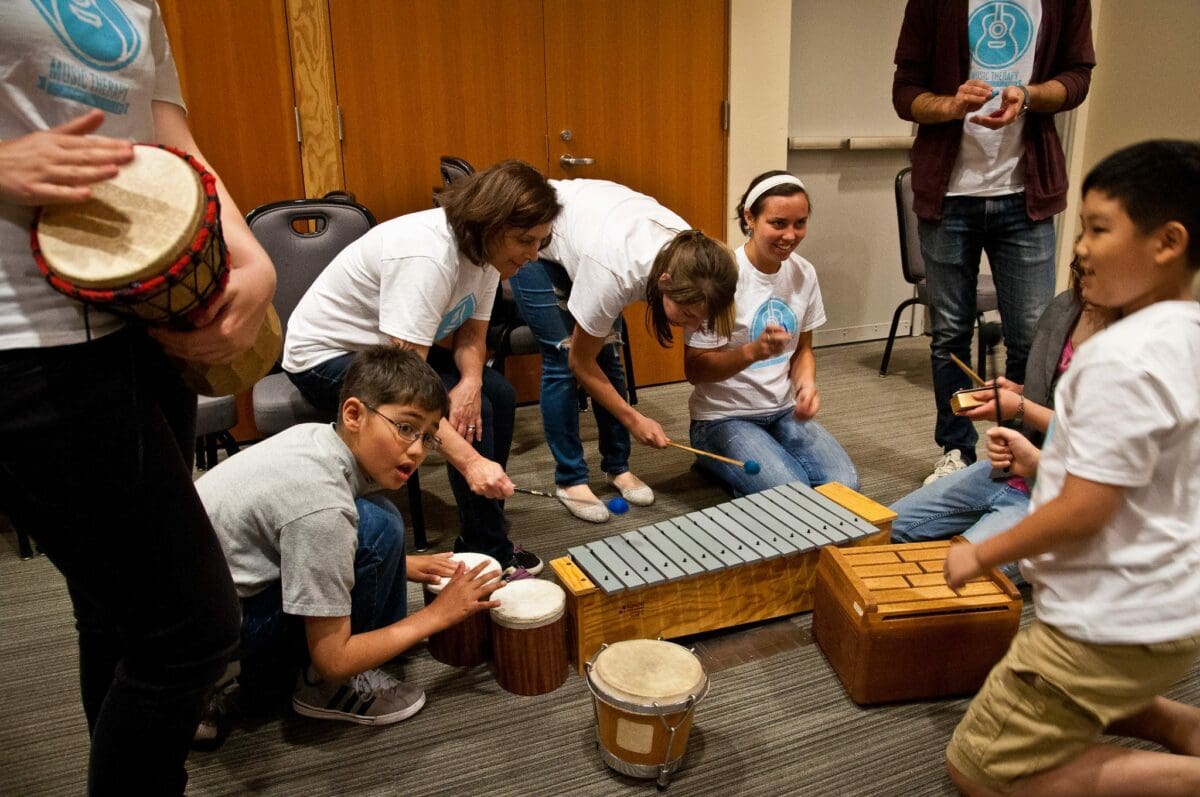
It is often said that music is “powerful.” One musical passage can inspire an entire stadium or bring a single person to tears. Inspiring, disappointing, and conjuring up any human emotion, from rage to joy, music can be a powerful force. But what is music therapy? Can music provide therapeutic relief to those suffering from cognitive, emotional, social, or physical disabilities?
Therapists who are certified in music therapy use music as a communication tool and tool to treat their patients. Despite its controversial nature, studies are increasingly pointing to the positive effects of music therapy.
From helping newborn babies form healthy bonds with their parents to offering vital, sensitive and compassionate palliative care at the end of life, music therapists draw upon the inherent qualities of music to support people of all ages and abilities. Music Therapy relies on the therapeutic relationship established between therapist and client through live musical interaction. Music is usually improvised and can be composed using a variety of styles and instruments. Using music in this way gives clients the opportunity to develop their own musical language for exploring and expressing themselves.
What is it?

People of all ages can benefit from music therapy, which focuses on helping them communicate well and make better emotional choices.
As a communication tool and to develop a relationship between client and therapist, music therapy does not aim to teach singing or how to play instruments.
This therapy is particularly useful for people who have difficulty speaking or communicating. Through music therapy, a music therapist helps a client achieve a therapeutic goal tailored to their personality and needs.
Who Can Access it?

There are a number of health care settings that use music therapy. It is often used with preschool-aged children, people with learning difficulties, people with disabilities, people with behavioral issues, and people with dementia and autism.
If a parent wishes to refer their child for music therapy, they can do so at the child’s school or to a doctor or social worker. Self-referrals are also possible.
How Does it Work?

It is common for music therapy sessions to involve client-led activities. This is where the therapist improvises a song or instrument in response to the client’s mood or sounds.
Clients are then encouraged to respond, resulting in music. This can create a musical interaction that fosters a sense of togetherness. Developing key communication skills such as awareness and decision-making is one of the benefits of this therapy.
The Role of a Music Therapist

A musical therapy program begins with a therapist assessing a patient’s condition. They will then discuss their musical preferences to develop a treatment plan.
Thus, in consultation with the patient, the therapist selects the instrument or instruments as well as the genre of music to be used in therapy.
The therapist and patient meet regularly to conduct their sessions, perhaps once a week, with the therapist monitoring, encouraging, and documenting progress. Typically, sessions are one-on-one, but senior citizens and children may be grouped together. When it comes to drug rehab, smaller groups are often used.
A music therapy session may take place in many settings, including hospitals, hospices, schools, prisons, and even in the home.
Do you have what it takes to be a music therapist? Music therapists are required to have certain musical skills in addition to strong interpersonal skills. In addition to playing piano, guitar, and percussion instruments proficiently, they must have some singing ability.
Benefits of Music Therapy

In addition to improving health, wellness, and educational goals, music therapy also helps people manage stress, reduce pain, express feelings and emotions, improve communication skills, enhance memory, and improve physical rehabilitation. In some cases, music therapy may be combined with physical therapy and occupational therapy to improve outcomes.
Music therapy can be used with clients of all ages, and the client does not need to have any musical ability to benefit.
How to Become a Music Therapist

The path to becoming a music therapist is not as simple as majoring in music and minoring in psychology. Professionals say a minor in psychology can be useful for entering the field. However, students with a psychology degree and a minor in music are not eligible to sit for the certification exam.
According to the American Music Therapy Association (AMTA), music therapy courses include music therapy, psychology, music, biology, social sciences, and general studies. Piano, guitar, and vocal proficiency are expected and most commonly used in therapy.
Additionally, music therapy students gain clinical experience outside of the classroom. This can be through partnerships with community clinics and facilities serving individuals with special needs.
There is a growing demand for music therapy in today’s society. Despite the waning effects of the Covid-19 virus across much of the United States, McAfee of the AMTA says musical interventions are essential to people’s mental health.
Summary
If you’re interested in music therapy as a patient or a therapist, this article is a great introduction into what to expect!
If you’re looking to learn more about Music, check out our other blog posts! We also have guides to help you understand Music Royalties, Music Licensing, and how to get started when it comes to selling your music online.
Are You An Artist?
Here at Мusic Gateway, we have recently started offering a selection of royalty-free music! We also have a massive music library full of incredible tracks. This is not royalty free, however, we have the copyright holder information and so we can help you license any track in our library very easily! Check it out today!
Not a member of Мusic Gateway yet? Why not! Take advantage of our 14-day no-strings-attached free trial, and join us in our mission to empower the global creative community. The game is changing, be a part of it…










